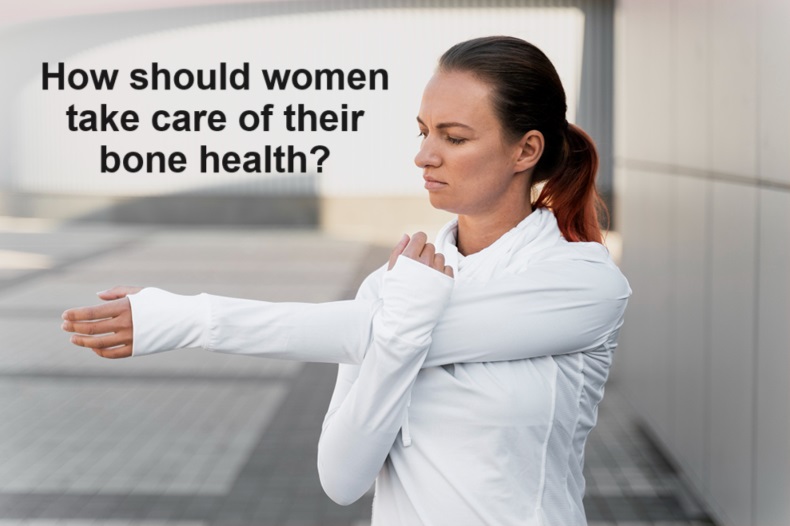- June 11, 2024
How Should Women Take Care of Their Bone Health?

Do you want to increase your bone strength and make them more resilient and healthy? If yes, go through the following article. Learn about everything you need to do for a strong skeletal system as a young woman.
Calcium
The first piece of advice is to ensure enough calcium in your diet as per the daily recommendation.
If you are a woman in her early 20s, dairy products are a must as they are always very rich in calcium and you need this essential nutrient—calcium—as your skeletal system starts reaching its maturity after the 20s.
Furthermore, as females lose bone density considerably after menopause, calcium becomes a crucial dietary component from that perspective too.
Bone density loss after menopause cannot be prevented. But, you can be well-prepared for this situation at a young age. In other words, the only thing that can be done with respect to postmenopausal osteoporosis is to ensure adequate calcium intake during the early 20s.
Soya products are great sources of calcium. If you are non-vegetarian, sardines, salmon and all other seafood with bones can be had to combat bone weakening while aging.
Besides, add fortified food items to your daily meals. Calcium supplements can be a good aid as well.
Many people have calcium supplements to deal with the problem of calcium deficiency and there is nothing wrong with it when taken under the supervision of an experienced medical practitioner.
Vitamin D
Many people don’t know this fact but our bodies cannot absorb calcium effectively because of the lack of vitamin D.
NIH, National Library of Medicine, says, “Optimal vitamin D levels are necessary to increase the efficiency of calcium absorption.”
The portal further corroborates this biological reality by furnishing the information that in the lack of adequate vitamin D, our body’s calcium absorption capacity falls dramatically.
“Without adequate vitamin D, the body absorbs no more than 10% to 15% of dietary calcium. In the vitamin D-sufficient state, the intestinal calcium absorption increases to 30% to 40%.”
Thus, along with calcium, making sure of this vitamin is crucial too. The following are good sources.
- Milk
- Fatty Fish
- Egg Yolks
- Cereal
- Orange Juice
- Mushrooms
- Yoghurt
- Cheese
If you are comfortable, you can even take supplements to ensure the recommended level of vitamin D within your body. So, every bit of calcium taken will be absorbed to increase the strength of your bones.
Antioxidants
In the human body, uncountable cells are found. These cells produce harmful chemicals, called free radicals, as a result of natural functioning.
These free radicals when exceeded in number compared to antioxidants, cause oxidative stress. Hence, oxidative stress is a disturbance in the delicate balance between free radicals and antioxidants in our body. This stress causes damage to bone cells and matrix.
The only way to best deal with this stress is as follows. Consume antioxidant-rich foods.
For antioxidants, consider the following food options:
- dark chocolate
- pecans
- artichokes
- goji berries
- blueberries
- strawberries
- raspberries
- red cabbage
- kale
- beans, etc.
All of these contain a lot of antioxidants, which are good for fighting oxidative stress.
If you need to consult an experienced orthopedic doctor, visit the following link: best orthopedic doctor in East Delhi.
Protein
Protein is essential for muscles. Without enough protein, you won’t be able to build enough muscle mass. But, protein doesn’t only contribute to muscle health. It is also vital for your bone and joint strength and resilience.
Protein is needed for better bone health as:
- Collagen is made out of protein. And, thus protein is important as Collagen is essential for a healthy bone matrix. To have enough collagen in the bone matrix, you must ensure enough protein intake.
- Our bones contain two types of cells, namely, osteoblasts and osteoclasts; the former is to form new bone cells while the latter is to deal with the damaged bone cells.
- Protein is also crucial for preventing bone density loss.
If you are non-vegetarian, you can easily follow protein-based dietary recommendations without much complication.
However, for a vegetarian, ensuring enough protein might be a challenge. Yet, you can have pulses, soy products, grains, nuts and seeds.
Alcohol and Smoking
Besides dietary caution, as explained so far, one who is concerned with their bone health must also stay away from psychoactive substances.
Such substances as alcohol and smoking shouldn’t be consumed limitlessly or, if possible, at all. These drugs interfere with your body’s capacity to absorb calcium and other essential minerals like potassium, magnesium, etc.
Thus, if you want your body to absorb the essential micro and macronutrients well after each meal, avoid all forms of substance abuse.
Physical Training
There is no doubt that good food is important for strong bones but without exercise, you won’t be able to achieve the highest bone mass density or peak bone mass before the skeletal maturation.
Engaging in physical exercise subjects our body to stress and strain, prompting it to adapt and strengthen. This adaptation process boosts our stamina.
So, exercise makes your bones and joints more strong and resilient by increasing bone mass density.
Thus, ensure calcium, vitamin D, and protein along with exercise, especially weight training for excellent bone health.
Conclusion
Following these instructions will help strengthen women’s bones over time. However, for more personalized advice, it is always recommended that you talk to an experienced orthopedic doctor or dietitian.
If you are interested, consider the following link: best knee pain doctor in Delhi India.
